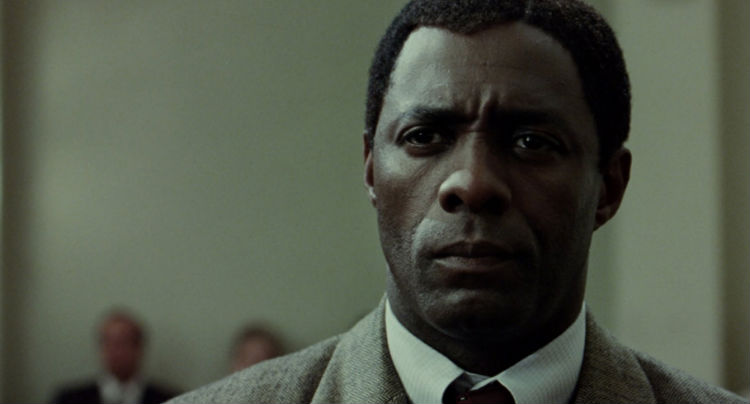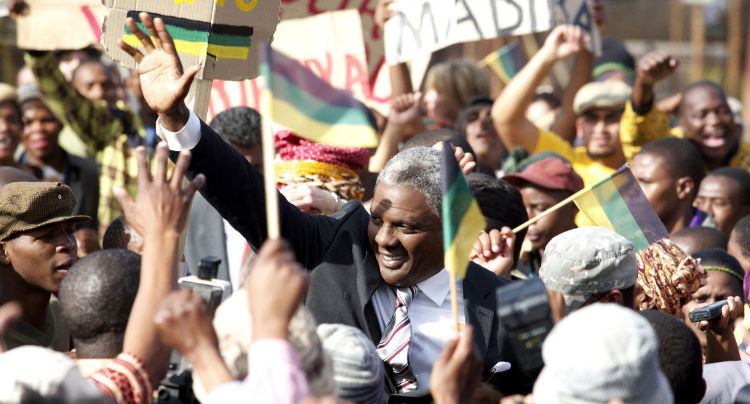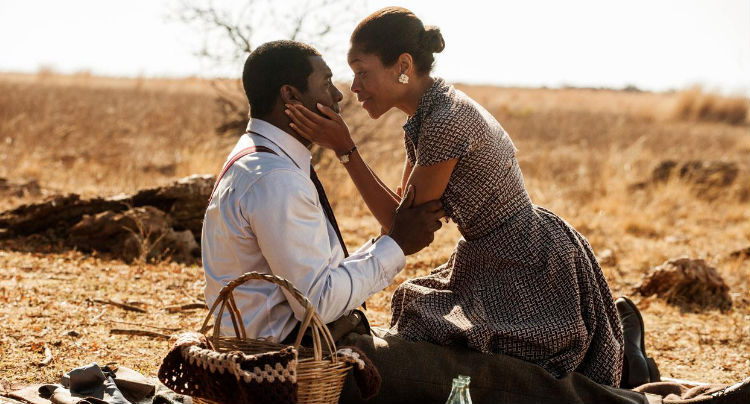
The filmmakers had better thank their lucky stars for Idris Elba, whose brilliance barely buoys the film.

The filmmakers had better thank their lucky stars for Idris Elba, whose brilliance barely buoys the film.
Mandela: Long Walk to Freedom falls into several of the common pitfalls hindering biopics of the same ilk–most notably an artistically inhibiting obedience to biographical milestones–and while director Justin Chadwick comes up short, Idris Elba turns in a thoughtful, commanding performance worthy of the recently deceased activist icon’s memory.
Though Elba bears little physical resemblance with his lumbering frame, he captures Mandela’s round, regal vocal intonations convincingly (though terrible make-up late in the film nearly breaks Elba’s illusion). What really sells Elba’s transformation is his keen focus on conveying Mandela’s struggle, strength, and conviction, as opposed to the Disney World “Hall of Presidents”, detail-obsessed performances found in Lee Daniels’ The Butler and Jobs from earlier this year. You can feel the power of Mandela’s ideals and prescient worldview in Elba’s every word and movement. Watching him plead with a prison official during his incarceration on Robben Island (shortly after receiving news that his son has died), explaining that it is his “duty as a father” to bury his son, is crushing.

It’s disappointing, frankly, that the film is so concerned with Mandela’s milestones rather than providing more insight into who he was at his core (Elba picks up the slack on that front). It’s clear that they built the film around a checklist of life events that they felt they absolutely had to hit, an approach that almost always diminishes the emotional impact of a film (an issue also afflicting the aforementioned Jobs, as well as this year’s abysmal Diana). We watch Mandela’s progression from fun-loving lawyer and amateur boxer, to anti-apartheid revolutionary and prisoner, to wise (and wisecracking) elderly activist icon, but the dutiful nature of it all results in a flatly paced, sedated hagiography.
The film gives little educational insight into the mechanics of apartheid, communicating, simply, that the whites hate the blacks. Most of the Africans’ perspective (represented by the ANC, a post office-bombing anti-establishment resistance group Mandela eventually led) is illuminated thoroughly through rousing speeches and weighty, lengthy private meetings, though the white antagonists are very much treated as pompous, evil, “others” and not human beings. It feels a bit unbalanced, but it’s a largely forgivable oversight, considering the atrocities committed (the brutality of which is handled tastefully and respectfully).
The rift that widens between Elba and an equally impassioned Naomie Harris (playing Mandela’s wife, Winnie Madikizela) is beautifully plotted and acted, the two talents clicking on all levels. Regrettably, Harris’ increasingly radical-thinking character devolves into a blood-hungry, unreasonable villain (and adulterer). Sure, Madikizela did indeed do all these things, and she was mentally traumatized due to her unjustified stint in prison (while Mandela was still locked away), but it’s the borderline-clichéd way in which she’s written in her final few scenes that feels a bit reductive. Harris, however, makes it work as best she can.

When Elba gets the make-up caked on to play the old sage-like, peacemaking figure we’re all so familiar with, it’s moving stuff. His reunion with his wife and family after finally (after over 27 years) emerging from the prison doors is tearjerking. Though early in his life Mandela deemed retaliatory violence as a just course of action for his people against the oppressive government, he ultimately proclaimed peaceful reconciliation as the solution to the country’s woes in a famous televised speech that’s reenacted well, here, in a stirring scene. If only the preceding two-plus hours of the film had been as involving…
Though Mandela isn’t particularly arresting, visually, some of Chadwick’s shots of the immense, serene South African landscapes are breathtaking. Late in life, when Mandela gets “upgraded” to a gorgeous house at the foot of a picturesque mountain (though he’s still technically imprisoned), Chadwick and DP Lol Crawley (Ballast, Four Lions) photograph the setting beautifully.
Mandela’s story is one of the most fascinating and inspiring in the history of the world, with peaks, valleys, awe-inspiring feats courage and solidarity, and a lasting impact on worldwide consciousness. Mandela is based on the man’s autobiography, so the material Chadwick and screenwriter William Nicholson had to work with is inherently amazing, yet they somehow managed to crank out an unremarkable (while brilliantly acted) picture. They’d better thank their lucky stars for Idris Elba, whose brilliance barely buoys the film.